| Chinese festivals are one of the most important part of Chinese culture.
Understanding Chinese festivals will greatly enhance Chinese learners' knowledge
on Chinese culture and history. Among many Chinese festivals, Spring Festival,
Mid-Autumn Festival, Dragon Boat Festival and Lantern Festival are the four most
famous festivals in Chinese people's lives. |
|
|
| Spring
Festival(春节) |
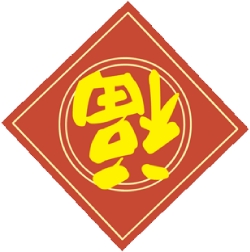 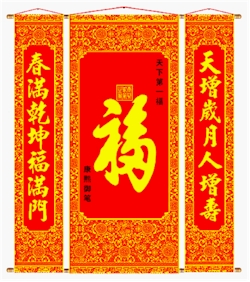 |
|
The Spring Festival is the most
important festival for the Chinese people and is when all
family members get together, just like Christmas in the
West. All people living away from home go back, becoming
the busiest time for transportation systems of about half
a month from the Spring Festival. Airports, railway
stations and long-distance bus stations are crowded with
home returnees.
The Spring Festival falls on the 1st day of the 1st lunar
month, often one month later than the Gregorian calendar.
It originated in the Shang Dynasty (c. 1600 BC-c. 1100 BC)
from the people's sacrifice to gods and ancestors at the
end of an old year and the beginning of a new one.
Strictly speaking, the Spring Festival starts every year
in the early days of the 12th lunar month and will last
till the mid 1st lunar month of the next year. Of them,
the most important days are Spring Festival Eve and the
first three days. The Chinese government now stipulates
people have seven days off for the Chinese Lunar New Year.
Many customs accompany the Spring Festival. Some are still
followed today, but others have weakened.
On the 8th day of the 12th lunar month, many families make
laba porridge, a delicious kind of porridge made with
glutinous rice, millet, seeds of Job's tears, jujube
berries, lotus seeds, beans, longan and gingko.
The 23rd day of the 12th lunar month is called Preliminary
Eve. At this time, people offer sacrifice to the kitchen
god. Now however, most families make delicious food to
enjoy.
After the Preliminary Eve, people begin preparing for the
coming New Year. This is called "Seeing the New Year in".
Store owners are busy then as everybody goes out to
purchase necessities for the New Year. Materials not only
include edible oil, rice, flour, chicken, duck, fish and
meat, but also fruit, candies and kinds of nuts. What's
more, various decorations, new clothes and shoes for the
children as well as gifts for the elderly, friends and
relatives, are all on the list of purchasing.
Before the New Year comes, the people completely clean the
indoors and outdoors of their homes as well as their
clothes, bedclothes and all their utensils.
Then people begin decorating their clean rooms featuring
an atmosphere of rejoicing and festivity. All the door
panels will be pasted with Spring Festival couplets,
highlighting Chinese calligraphy with black characters on
red paper. The content varies from house owners' wishes
for a bright future to good luck for the New Year. Also,
pictures of the god of doors and wealth will be posted on
front doors to ward off evil spirits and welcome peace and
abundance.
The Chinese character "fu" (meaning blessing or happiness)
is a must. The character put on paper can be pasted
normally or upside down, for in Chinese the "reversed fu"
is homophonic with "fu comes", both being pronounced as "fudaole."
What's more, two big red lanterns can be raised on both
sides of the front door. Red paper-cuttings can be seen on
window glass and brightly colored New Year paintings with
auspicious meanings may be put on the wall.
People attach great importance to Spring Festival Eve. At
that time, all family members eat dinner together. The
meal is more luxurious than usual. Dishes such as chicken,
fish and bean curd cannot be excluded, for in Chinese,
their pronunciations, respectively "ji", "yu" and "doufu,"
mean auspiciousness, abundance and richness. After the
dinner, the whole family will sit together, chatting and
watching TV. In recent years, the Spring Festival party
broadcast on China Central Television Station (CCTV) is
essential entertainment for the Chinese both at home and
abroad. According to custom, each family will stay up to
see the New Year in.
Waking up on New Year, everybody dresses up. First they
extend greetings to their parents. Then each child will
get money as a New Year gift, wrapped up in red paper.
People in northern China will eat jiaozi, or dumplings,
for breakfast, as they think "jiaozi" in sound means
"bidding farewell to the old and ushering in the new".
Also, the shape of the dumpling is like gold ingot from
ancient China. So people eat them and wish for money and
treasure.
Southern Chinese eat niangao (New Year cake made of
glutinous rice flour) on this occasion, because as a
homophone, niangao means "higher and higher, one year
after another." The first five days after the Spring
Festival are a good time for relatives, friends, and
classmates as well as colleagues to exchange greetings,
gifts and chat leisurely.
Burning fireworks was once the most typical custom on the
Spring Festival. People thought the spluttering sound
could help drive away evil spirits. However, such an
activity was completely or partially forbidden in big
cities once the government took security, noise and
pollution factors into consideration. As a replacement,
some buy tapes with firecracker sounds to listen to, some
break little balloons to get the sound too, while others
buy firecracker handicrafts to hang in the living room.
The lively atmosphere not only fills every household, but
permeates to streets and lanes. A series of activities
such as lion dancing, dragon lantern dancing, lantern
festivals and temple fairs will be held for days. The
Spring Festival then comes to an end when the Lantern
Festival is finished.
China has 56 ethnic groups. Minorities celebrate their
Spring Festival almost the same day as the Han people, and
they have different customs.
|
春节,是农历正月初一,又叫阴历年,俗称“过年”,这是我国民间最隆重、最热闹的一个传统节日。春节的历史很悠久,它起源于殷商时期年头岁尾的祭神祭祖活动。按照我国农历,正月初一古称元日、元辰、元正、元朔、元旦等,俗称年初一,到了民国时期,改用公历,公历的一月一日称为元旦,把农历的一月一日叫春节。
春节到了,意味着春天将要来临,万象复苏草木更新,新一轮播种和收获季节又要开始。人们刚刚度过冰天雪地草木凋零的漫漫寒冬,早就盼望着春暖花开的日子,当新春到来之际,自然要充满喜悦载歌载舞地迎接这个节日。
千百年来,人们使年俗庆祝活动变得异常丰富多彩,每年从农历腊月二十三日起到年三十,民间把这段时间叫做“迎春日”,也叫“扫尘日”,在春节前扫尘搞卫生,是我国人民素有的传统习惯。
然后就是家家户户准备年货,节前十天左右,人们就开始忙于采购物品,年货包括鸡鸭鱼肉、茶酒油酱、南北炒货、糖饵果品,都要采买充足,还要准备一些过年时走亲访友时赠送的礼品,小孩子要添置新衣新帽,准备过年时穿。
在节前要在住宅的大门上粘贴红纸黄字的新年寄语,也就是用红纸写成的春联。屋里张贴色彩鲜艳寓意吉祥的年画,心灵手巧的姑娘们剪出美丽的窗花贴在窗户上,门前挂大红灯笼或贴福字及财神、门神像等,福字还可以倒贴,路人一念福倒了,也就是福气到了,所有这些活动都是要为节日增添足够的喜庆气氛。
春节的另一名称叫过年。在过去的传说中,年是一种为人们带来坏运气的想象中的动物。年一来。树木凋蔽,百草不生;年一过,万物生长,鲜花遍地。年如何才能过去呢?需用鞭炮轰
,于是有了燃鞭炮的习俗,这其实也是烘托热闹场面的又一种方式。
春节是个欢乐祥和的节日,也是亲人团聚的日子,离家在外的孩子在过春节时都要回家欢聚。过年的前一夜,就是旧年的腊月三十夜,也叫除夕,又叫团圆夜,在这新旧交替的时候,守岁是最重要的年俗活动之一,除夕晚上,全家老小都一起熬年守岁,欢聚酣饮,共享天伦之乐,北方地区在除夕有吃饺子的习俗,饺子的作法是先和面,和字就是合;饺子的饺和交谐音,合和交有相聚之意,又取更岁交子之意。在南方有过年吃年糕的习惯,甜甜的粘粘的年糕,象征新一年生活甜蜜蜜,步步高。
待第一声鸡啼响起,或是新年的钟声敲过,街上鞭炮齐鸣,响声此起彼伏,家家喜气洋洋,新的一年开始了,男女老少都穿着节日盛装,先给家族中的长者拜年祝寿,节中还有给儿童压岁钱,吃团年饭,初二、三就开始走亲戚看朋友,相互拜年,道贺祝福,说些恭贺新喜、恭喜发财、恭喜、过年好等话,祭祖等活动。
节日的热烈气氛不仅洋溢在各家各户,也充满各地的大街小巷,一些地方的街市上还有舞狮子,耍龙灯,演社火,游花市,逛庙会等习俗。这期间花灯满城,游人满街,热闹非凡,盛况空前,直要闹到正月十五元宵节过后,春节才算真正结束了。
春节是汉族最重要的节日,但是满、蒙古,瑶、壮、白、高山、赫哲、哈尼、达斡尔、侗、黎等十几个少数民族也有过春节的习俗,只是过节的形式更有自己的民族特色,更蕴味无穷。
|
|
Mid-Autumn Festival (中秋节) |
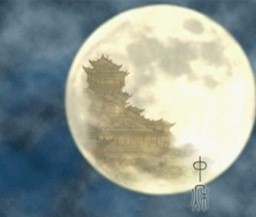
 |
|
The Mid-Autumn Festival falls on the 15th day of the 8th
lunar month, usually in October in Gregorian calendar. It
will fall on September 14, 2008.
The festival has a long history. In ancient China,
emperors followed the rite of offering sacrifices to the
sun in spring and to the moon in autumn. Historical books
of the Zhou Dynasty had had the word "Mid-Autumn". Later
aristocrats and literary figures helped expand the
ceremony to common people. They enjoyed the full, bright
moon on that day, worshipped it and expressed their
thoughts and feelings under it. By the Tang Dynasty
(618-907), the Mid-Autumn Festival had been fixed, which
became even grander in the Song Dynasty (960-1279). In the
Ming (1368-1644) and Qing (1644-1911) dynasties, it grew
to be a major festival of China.
Folklore about the origin of the festival go like this: In
remote antiquity, there were ten suns rising in the sky,
which scorched all crops and drove people into dire
poverty. A hero named Hou Yi was much worried about this,
he ascended to the top of the Kunlun Mountain and,
directing his superhuman strength to full extent, drew his
extraordinary bow and shot down the nine superfluous suns
one after another. He also ordered the last sun to rise
and set according to time. For this reason, he was
respected and loved by the people and lots of people of
ideals and integrity came to him to learn martial arts
from him. A person named Peng Meng lurked in them.
Hou Yi had a beautiful and kindhearted wife named Chang E.
One day on his way to the Kunlun Mountain to call on
friends, he ran upon the Empress of Heaven Wangmu who was
passing by. Empress Wangmu presented to him a parcel of
elixir, by taking which, it was said, one would ascend
immediately to heaven and become a celestial being. Hou
Yi, however, hated to part with his wife. So he gave the
elixir to Chang E to treasure for the time being. Chang E
hid the parcel in a treasure box at her dressing table
when, unexpectedly, it was seen by Peng Meng.
One day when Hou Yi led his disciples to go hunting, Peng
Meng, sword in hand, rushed into the inner chamber and
forced Chang E to hand over the elixir. Aware that she was
unable to defeat Peng Meng, Chang E made a prompt decision
at that critical moment. She turned round to open her
treasure box, took up the elixir and swallowed it in one
gulp. As soon as she swallowed the elixir her body floated
off the ground, dashed out of the window and flew towards
heaven. Peng Meng escaped.
When Hou Yi returned home at dark, he knew from the
maidservants what had happened. Overcome with grief, Hou
Yi looked up into the night sky and called out the name of
his beloved wife when, to his surprise, he found that the
moon was especially clear and bight and on it there was a
swaying shadow that was exactly like his wife. He tried
his best to chase after the moon. But as he ran, the moon
retreated; as he withdrew, the moon came back. He could
not get to the moon at all.
Thinking of his wife day and night, Hou Yi then had an
incense table arranged in the back garden that Chang E
loved. Putting on the table sweetmeats and fresh fruits
Chang E enjoyed most, Hou Yi held at a distance a memorial
ceremony for Chang E who was sentimentally attached to him
in the palace of the moon.
When people heard of the story that Chang E had turned
into a celestial being, they arranged the incense table in
the moonlight one after another and prayed kindhearted
Chang E for good fortune and peace. From then on the
custom of worshiping the moon spread among the people.
People in different places follow various customs, but all
show their love and longing for a better life. Today
people will enjoy the full moon and eat moon cakes on that
day.
The moon looks extremely round, big and bright on the 15th
day of each lunar month. People selected the August 15 to
celebrate because it is a season when crops and fruits are
all ripe and weather pleasant. On the Mid-Autumn Festival,
all family members or friends meet outside, putting food
on tables and looking up at the sky while talking about
life. How splendid a moment it is!
|
每年农历八月十五日,是传统的中秋佳节。这时是一年秋季的中期,所以被称为中秋。在中国的农历里,一年分为四季,每季又分为孟、仲、季三个部分,因而中秋也称仲秋。八月十五的月亮比其他几个月的满月更圆,更明亮,所以又叫做“月夕”,“八月节”。此夜,人们仰望天空如玉如盘的朗朗明月,自然会期盼家人团聚。远在他乡的游子,也借此寄托自己对故乡和亲人的思念之情。所以,中秋又称“团圆节”。
我国人民在古代就有“秋暮夕月”习俗。夕月,即祭拜月神。到了周代,每逢中秋夜都要举行迎寒和祭月。设大香案,摆上月饼、西瓜、苹果、红枣、李子、葡萄等祭品,其中月饼和西瓜是绝对不能少的。西瓜还要切成莲花状。在月下,将月亮神像放在月亮的那个方向,红烛高燃,全家人依次拜祭月亮,然后由当家主妇切开团圆月饼。切的人预先算好全家共有多少人,在家的,在外地的,都要算在一起,不能切多也不能切少,大小要一样。
相传古代齐国丑女无盐,幼年时曾虔诚拜月,长大后,以超群品德入宫,但未被宠幸。某年八月十五赏月,天子在月光下见到她,觉得她美丽出众,后立她为皇后,中秋拜月由此而来。月中嫦娥,以美貌著称,故少女拜月,愿“貌似嫦娥,面如皓月”。
在唐代,中秋赏月、玩月颇为盛行。在北宋京师。八月十五夜,满城人家,不论贫富老小,都要穿上成人的衣服,焚香拜月说出心愿,祈求月亮神的保佑。南宋,民间以月饼相赠,取团圆之义。有些地方还有舞草龙,砌宝塔等活动。明清以来,中秋节的风俗更加盛行;许多地方形成了烧斗香、树中秋、点塔灯、放天灯、走月亮、舞火龙等特殊风俗。
今天,月下游玩的习俗,已远没有旧时盛行。但设宴赏月仍很盛行,人们把酒问月,庆贺美好的生活,或祝远方的亲人健康快乐,和家人“千里共婵娟”。
中秋节的习俗很多,形式也各不相同,但都寄托着人们对生活无限的热爱和对美好生活的向往。
|
| Dragon
Boat Festival (端午节) |
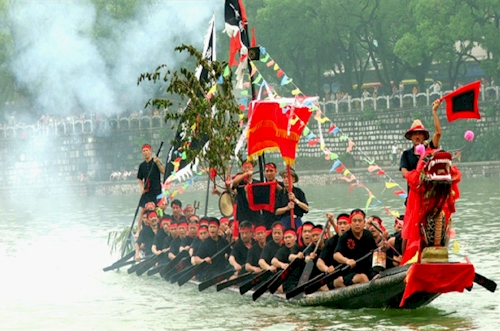 |
|
The Dragon Boat Festival is a lunar holiday, occurring on
the fifth day of the fifth lunar month
The Chinese Dragon Boat Festival is a significant holiday
celebrated in China, and the one with the longest history.
The Dragon Boat Festival is celebrated by boat races in
the shape of dragons. Competing teams row their boats
forward to a drumbeat racing to reach the finish end
first. Annual races take place all over China, Hong Kong,
Macao, Taiwan, and other overseas Chinese communities.
The boat races during the Dragon Boat Festival are
traditional customs to attempts to rescue the patriotic
poet Chu Yuan. Chu Yuan drowned on the fifth day of the
fifth lunar month in 277 B.C. Chinese citizens now throw
bamboo leaves filled with cooked rice into the water.
Therefore the fish could eat the rice rather than the
heroic poet. This later on turned into the custom of
eating Zong Zi. Zong Zi is a glutinous rice ball, with a
filling, wrapped in corn leaves. The fillings can be egg,
beans, dates, fruits, sweet potato, walnuts, mushrooms,
meat, or a combination of them. They are generally
steamed.
The celebration is a time for protection from evil and
disease for the rest of the year. It is done so by
different practices such as hanging healthy herbs on the
front door, drinking nutritious concoctions, and
displaying portraits of evil's nemesis, Zhong Kui. If one
manages to stand an egg on it's end at exactly 12:00 noon,
the following year will be a lucky one.
|
农历五月初五是端午节。两千多年来,端午节一直是一个多民族的全民健身、防疫祛病、避瘟驱毒、祈求健康的民俗佳节。
端午节又名端阳节、重午节,据传是中国古代伟大诗人、世界四大文化名人之一的屈原投汩罗江殉国的日子。两千多年来,每年的农历五月初五就成为了纪念屈原的传统节日。史料记载,公元前278年农历五月初五,楚国大夫、爱国诗人屈原听到秦军攻破楚国都城的消息后,悲愤交加,心如刀割,毅然写下绝笔作《怀沙》,抱石投入汨罗江,以身殉国。沿江百姓纷纷引舟竞渡前去打捞,沿水招魂,并将粽子投入江中,以免鱼虾蚕食他的身体。这一习俗绵延至今,已有两千多年。
千百年来,屈原的爱国精神和感人诗辞,深入人心。人们“而哀之,世论其辞,以相传焉”在民俗文化领域,中国民众从此把端午节的龙舟竞渡和吃粽子等,与纪念屈原紧密联系在一起。随着屈原影响的不断增大,始于春秋战国的端午节也逐步传播开来,成为中华民族的节日。
中国的端午节还有许多别称,如:午日节、五月节、浴兰节、女儿节、天中节、诗人节、龙日等等。虽然名称不同,但各地人们过节的习俗却大同小异。内容主要有:女儿回娘家,挂钟馗像,悬挂菖蒲、艾草,佩香囊,赛龙舟,比武,击球,荡秋千,给小孩涂雄黄,饮用雄黄酒、吃咸蛋、粽子和时令鲜果等,除了有迷信色彩的活动逐渐消失外,其余习俗至今已流传中国各地及邻近的国家。
|
| Lantern
Festival (元宵节) |
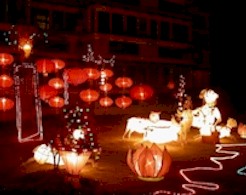
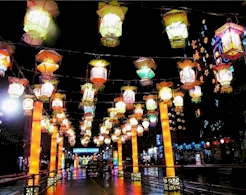 |
|
The Lantern Festival or Yuanxiao Jie is a traditional
Chinese festival, which is on the 15th of the first month
of the Chinese New Year. The festival marks the end of the
celebrations of the Chinese New Year. Chinese started to
celebrate the Lantern Festival from the Han Dynasty (206
BC - 221 AD). Like most other Chinese festivals, there is
also a story behind the Festival. It is also believed that
the festival has Taoist origins. This is a festival for
people having fun. On the night of the festival, people go
on streets with a variety of lanterns under the full moon,
watching lions or dragon dancing, playing Chinese riddles
and games, and lighting up firecrackers. There is really a
lot of fun for the young and the old. Yuanxiao (glutinous
rice ball) or Tangyuan is the special food for the Lantern
Festival. It is believed that Yuanxiao is named after a
palace maid, Yuanxiao, of Emperor Wu Di of the Han
Dynasty. Yuanxiao is a kind of sweet dumpling, which is
made with sticky rice flour filled with sweet stuffing.
Yuanxiao is sticky, sweet and round in shape, symbolizing
family unity, completeness and happiness.
|
“灯节”者叫做“元宵节”中国的传统佳节,在每年的农历正月十五这一天庆祝。元宵节的到来也标志着春节的结束。元宵节的传统可以追溯到西汉时期,像其他的
传统节日一样,关于元宵节也有一个美丽的传说。据说,与道家的传统有关。 按中国民间的传统,在这天上皓月高悬的夜晚,人们要点起彩灯万盏,以示庆贺。出门赏月、燃灯放焰、喜猜灯谜、共吃元宵,合家团聚、同庆佳节,其乐融融。元宵(黏米团子)或者叫做汤圆是元宵节这一天必吃的食物。相传汉武帝时宫中有一位宫女,名叫“元宵”,长年幽于宫中,思念父母,终日以泪洗面。大臣东方朔决心帮助她,于是对汉武帝谎称,火神奉玉帝之命于正月十五火烧长安,要逃过动难,唯一的办法是让“元宵姑娘”正月十五这天做很多火神爱吃的汤圆,并由全体臣民张灯供奉。武帝准凑,“元宵姑娘”终于见到家人。此后,便形成了元宵节。元宵这种食物实际上是甜馅“饺子”一种,用粘糯米和甜的馅料制成。元宵口感粘糯,口味香甜,外观浑圆,象征着一家人团圆、美满和幸福。
|
| Qing
Ming Festival (清明节) |
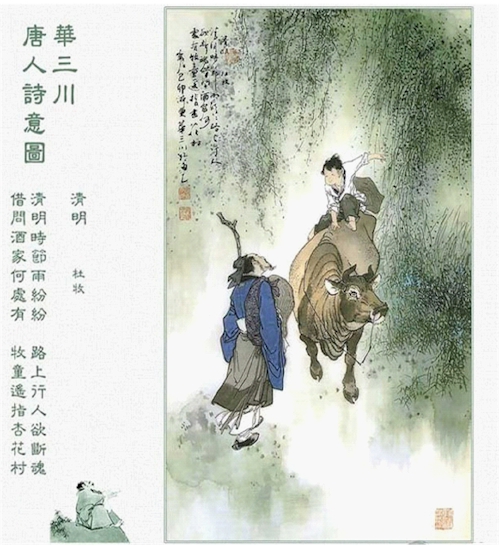 |
|
A well-known poem by Tang Dynasty writer Du Mu tells of a
sad scene in early April: "rains fall heavily as Qing Ming
comes, and passers-by with lowered spirits go." Qingming
Day, the traditional tomb-sweeping day, falls on April 4-6
each year. It is a time for remembering loved ones who
have departed. People visit their ancestors' graves to
sweep away the dirt. Its origin dates back to the Spring
and Autumn Period. Jin prince Chong'er ran away from the
country with his supporters due to persecution. They were
homeless for 19 years and things got so bad that Chong'er
began to starve to death. One of the prince's faithful
followers, Jie Zitui, cut a piece of muscle from his own
leg and served it to his master. Chong'er was saved and,
in 636 BC, he took back the throne. He rewarded the
officials who had stayed loyal to him but he forgot about
Jie Zitui. By the time Chong'er remembered him, a
heartbroken Jie Zitui had traveled deep into the
mountains. Chong'er wanted to persuade Jie to come home,
so he had the hills set on fire. But Jie was later found
beside a large tree, with his old mother on his back. Both
were dead. Saddened by the tragedy, Chong'er ordered that
fires could not be lit on the day of Jie Zitui's death.
From this comes Hanshi Day, or Cold Food Day. People
visited Jie Zitui's tomb the next day to pay their
respects. Over time, Hanshi Day was replaced with Qing
Ming Festival.
|
唐朝著名诗人杜牧有一首著名的诗,描述了四月初令人伤感的一幕场景:“清明时节雨纷纷,路上行人欲断魂。”年4月4-6日左右的清明节是传统的扫墓的日子。在这一天,人们祭吊去世的亲人,到先人的坟头上扫墓。
清明节可以追溯到春秋时代。晋国公子重耳因受到迫害,率其支持者出逃。19年间,他们居无定所,漂泊四方。一次,他们的处境相当窘迫,重耳饿得快不行了。这时,忠心耿耿的介子推从自己的腿上割下一块肉献给了重耳,公子重耳得救了。公元前636年,他夺回了王位。即位之后,重耳对支持者大加封赏,却忘记了介子推。等到想起这位忠臣时,伤心的介子推早已遁入山林深处。重耳想逼他回来,所以就大火焚山。后来,在一棵大树旁边发现了背着老母的介子推。两人都被烧死了。
重耳悲痛欲绝。他下令,在介子推的忌日不准生火。寒食节即来源于此。寒食节的次日,人们到介子推的坟头上致敬。随着时间的推移,寒食节被清明节所取代。
|
|
-
Sign up for a
free trial now! - |

